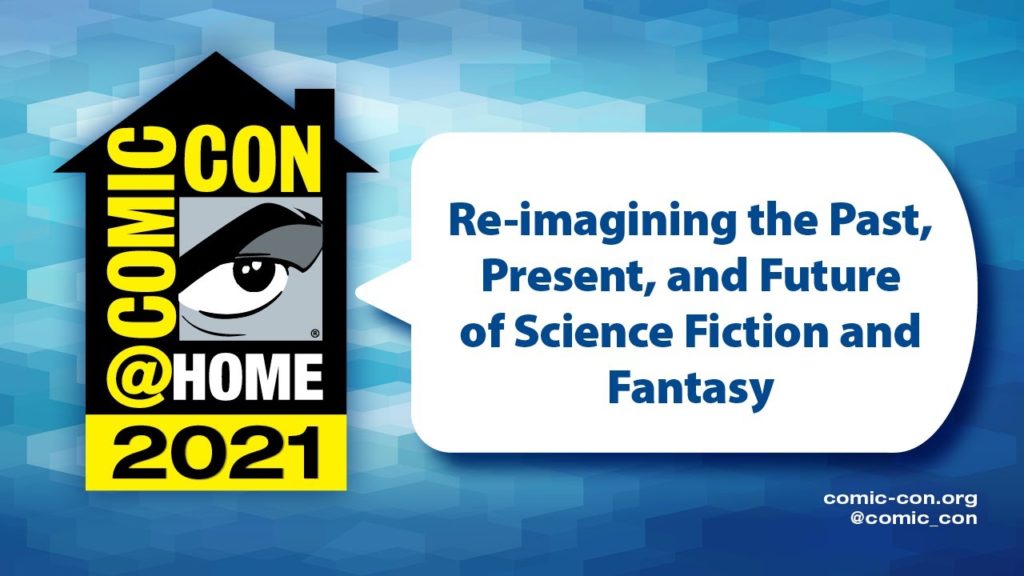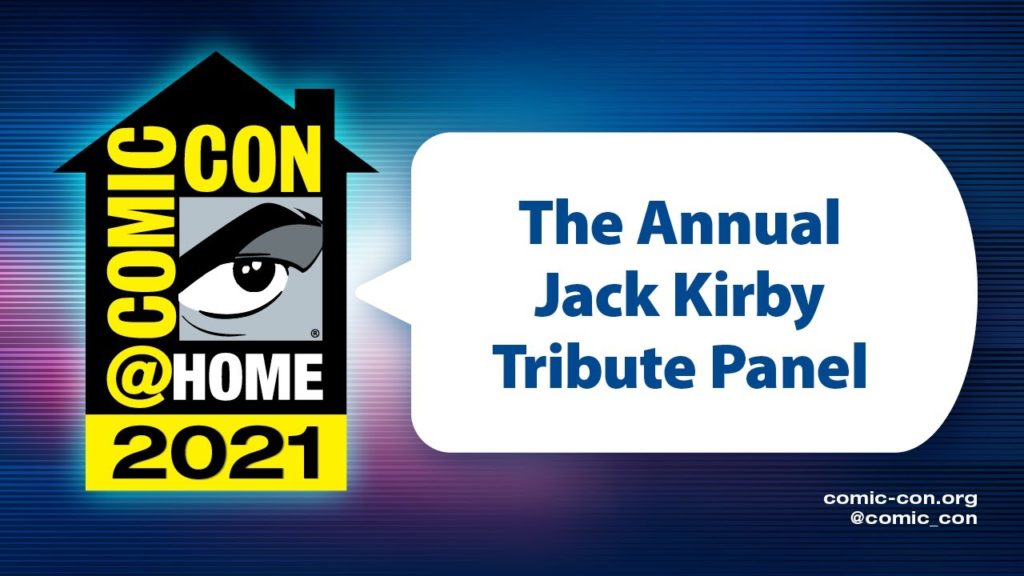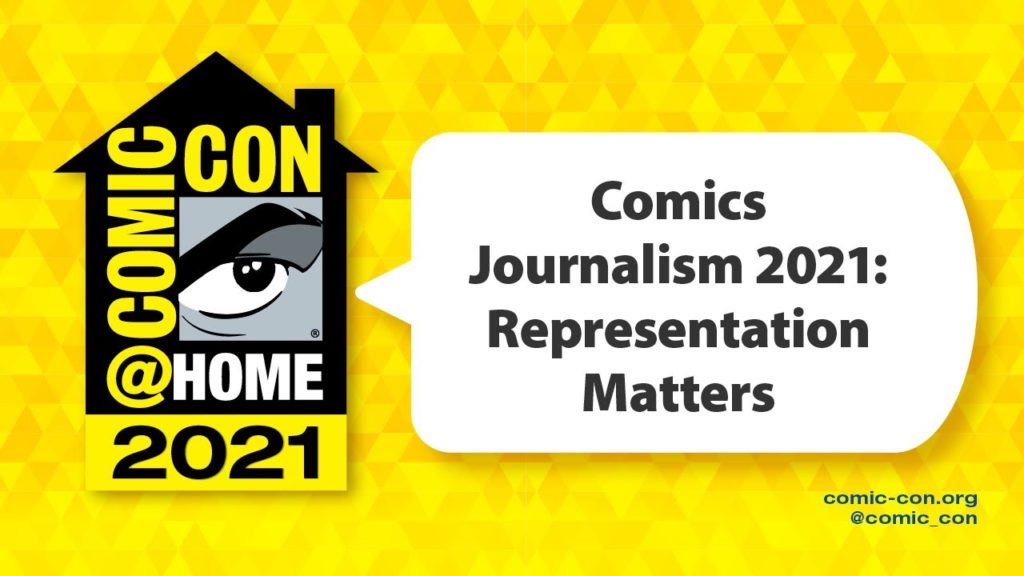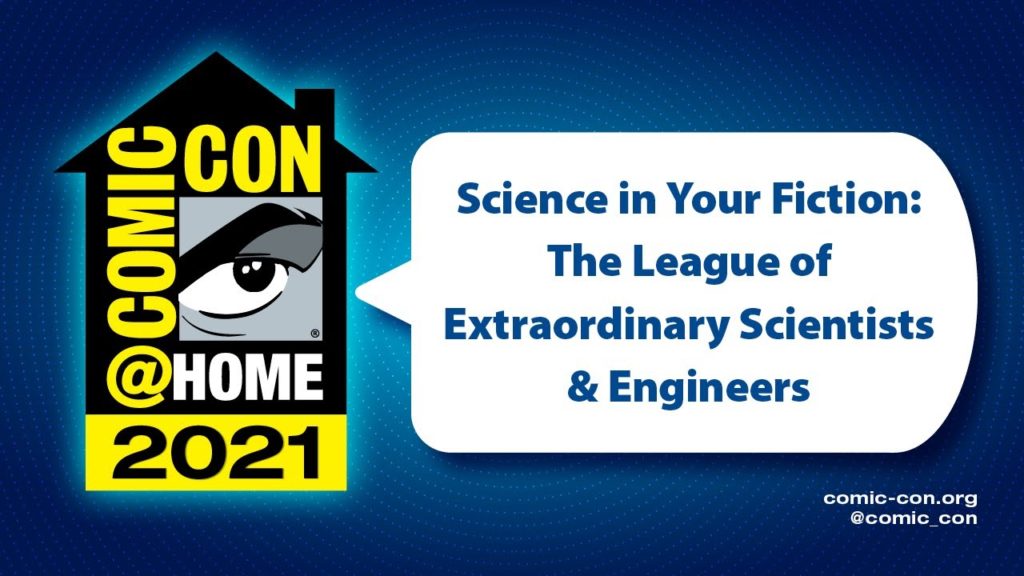Comic-Con@Home 2021! Sunday
July 27, 2021
Here we are at the final day of Comic-Con@Home 2021!
As I have mentioned in previous coverage, the bulk of the Comic-Con@Home experience is the panels, so just like in the previous days, here is some thoughts on the Sunday panels that I checked out.
One of the different parts of Sunday is that some of my con buddies and I got together to talk about comics, what panels we had watched, and to generally catch up. It’s what makes me miss the cons, the chance to hang out and spend time with friends in the con setting that I enjoy so much.
Well, onward, to the panels!
Re-imagining the Past, Present, and Future of Science Fiction and Fantasy
 This panel consists of three authors talking about sci-fi. My kind of panel. The panelists are Simon Jimenez (The Vanished Birds), Micaiah Johnson (The Space Between Worlds), and Heather Walter (Malice). Del Rey senior editor Sarah Peed is the moderator.
This panel consists of three authors talking about sci-fi. My kind of panel. The panelists are Simon Jimenez (The Vanished Birds), Micaiah Johnson (The Space Between Worlds), and Heather Walter (Malice). Del Rey senior editor Sarah Peed is the moderator.
This is another “authors talking about their work and influences” panel.
For the “past” portion of the panel, they talk about influences on their work, and how they arrived at sci-fi as a genre. The influences they mention ranges from video games to other books, and even childhood cartoons.
They discuss the themes of their books, and the relationships that they developed in our books for the “present” portion of this panel. They also talked about some of the influences that they, um, “borrowed” from to create their worlds.
The “future” part of this panel is a discussion of what is coming up for these authors. They wrap up with a discussion of what they think we will all see, and what they would like to see, in future science fiction and fantasy.
I think I would have enjoyed this panel more if I knew these author’s works. I was hoping that it would be more general in nature, and talked more about influences on science-fiction and fantasy in general. Instead, this panel dives into the experiences of the panelists. If you are a fan of any of these authors, then this may be worth checking out.
The Annual Jack Kirby Tribute Panel
 Mark Evanier, a former assistant to Jack Kirby, hosts this panel (as usual). He is joined by Walter Simonson and Paul Levitz. This panel is all about appreciating Jack Kirby, the King of Comics.
Mark Evanier, a former assistant to Jack Kirby, hosts this panel (as usual). He is joined by Walter Simonson and Paul Levitz. This panel is all about appreciating Jack Kirby, the King of Comics.
Walter Simonson talks about discovering Kirby’s Thor comics when he was in college, which is a cool story, considering his legendary run on Thor.
Paul Levitz talked about working on fanzines when Kirby was writing the Fourth World comics, and that he would see the fresh pages as they were coming into the DC offices.
Paul Levitz also talked about why the Fourth World books were eventually cancelled, despite solid sales. This leads to stories about why Kirby was offered the job at DC, and some of the business decisions behind that move. As usual, the business interfered with the artistic production in certain ways, which is discussed and explained by the panelists.
An interesting spin-out from this conversation is royalties, and how DC implemented royalties under Paul Levitz and Jenette Kahn. This led to Marvel creating a royalties program, and this changed the industry in many ways for the better, at least as far as the creators are concerned. When the Kenner DC Super-Heroes toys cam out, DC came up with an interesting work around to give Jack Kirby royalties on Darkseid and other Fourth World characters, even though Kirby created those characters before the royalty program was implemented.
This leads to a discussion of royalty programs in general, and the effect they had on creators, which trickles down to the effect it had on the industry. I enjoyed the perspective and history shared in this part of the panels.
They also talked about the longevity of the Fourth World stories, and how they have continued to be reprinted in collections, which is a demonstration of how those stories resonate with people.
I have attended quite a few Kirby panels at various cons now. Some of them lean into Kirby fandom, and playing the Chris Farley “wasn’t that cool” game. Other panels look at a lot of the history of Kirby’s artwork, and the history of the industry around Kirby. This panel is an example of the latter, and is a very good viewing for any fan of the history of comics.
Comics Journalism 2021: Representation Matters
 This panel speaks to some of my interests in comics journalism. Heidi MacDonald moderates, and has a conversation with Wendy Browne and Tiffany Babb about comics journalism.
This panel speaks to some of my interests in comics journalism. Heidi MacDonald moderates, and has a conversation with Wendy Browne and Tiffany Babb about comics journalism.
They focus on finding and amplifying voices of marginalized people, and how, and why to do that. They discuss the “boys club” in comics journalism, and if that is changing, and the ways that can be changed by the actions taken by the panelists.
They also discuss the phenomenon where people have hostile comments to seemingly innocuous statements. You know, the type of thing that happens on Twitter every day. Moderation of comments becomes necessary to filter out the hate speech and harassment.
Monetization comes up, and they stress that comics journalism is largely a labor of love, and doesn’t exactly pay the bills. In case you didn’t know, there is not a lot of money in comics journalism. This is augmented the less that journalists cover mainstream, widely read titles like Batman or Spider-Man. The problem this brings up is that people can’t afford to create comics journalism, because it doesn’t pay well. The result is that a lot of comics discourse is created by people that are lucky enough to be in a position where they don’t need to be making a lot of money.
The conversation is rounded out by discussion of some of the titles that they have been reading and enjoying lately. This spills out into some discussion of why they love these things, and how it impacts the way they write about comics.
There are some other topics they tackle, such as balancing representation with tokenism, how to find new voices and get them to write, and how to improve comics journalism.
Science in Your Fiction: The League of Extraordinary Scientists & Engineers
 This panel is about the League of Extraordinary Scientists & Engineers.
This panel is about the League of Extraordinary Scientists & Engineers.
This panel featured a large cast of scientists and engineers. The introductions were extensive. I specifically mention extensive because each of the scientists and engineers took quite a bit of time to talk about their field and what specifically they do. This alone was interesting to hear. As a fan of science, I would have enjoyed each of these panelists spending the entire panel time just talking about their field and the work that they do.
In fact, the introductions are so extensive, that they take up over half the panel.
Once they get past introductions, they talk about some of their scientific discoveries that they have been involved with. This includes new species of fish and microbes, and this has a surprising similarity to animation, because the creator or discoverer has to make sure the name isn’t already used.
The panelists also discuss advice they have for younger people that want to follow them into these various STEM fields. This also leads into how to tackle barriers or setbacks while pursuing their careers. They bring up an interesting point, which is that science is often about getting things wrong repeatedly, and learning from that.
This panel was a little perplexing, because the introductions took up so much of the panel, and there wasn’t a lot of time spent on the meat of the panel. Also, the “meat” of the panel didn’t really tackle the description of the panel, which was about the science in our fiction, and how comics and sci-fi pushes scientists to expand boundaries of their studies. Except for a few brief mentions form panelists that they liked science-fiction and/or fantasy, they really didn’t touch on the influence and relationships that occur between science and sci-fi.
In the end, this panel ended up being more of, “here are some interesting scientists and engineers that work on interesting things”.
Wrap-Up
I started this coverage by saying that I miss conventions. I miss walking the floor, seeing people and things, and being surrounded by this hobby that I enjoy so much.
I always leave Comic-Con inspired to do more, to create more, and to read more. I leave wanting to expand my horizons and expose myself to new and different comics and stories.
Comic-Con@Home isn’t the same as the real thing in San Diego, but I did get a little bit of that inspiration. I left wanting to try out a few new different things, and with some ideas for things that I want to make. Conventions always get my creative juices flowing. Comic-Con@Home was able to get me just a touch of that.
Here’s to things improving, and seeing you in San Diego in person next year.
If you want to check out my recaps of previous days from Comic-Con@Home, here you go: